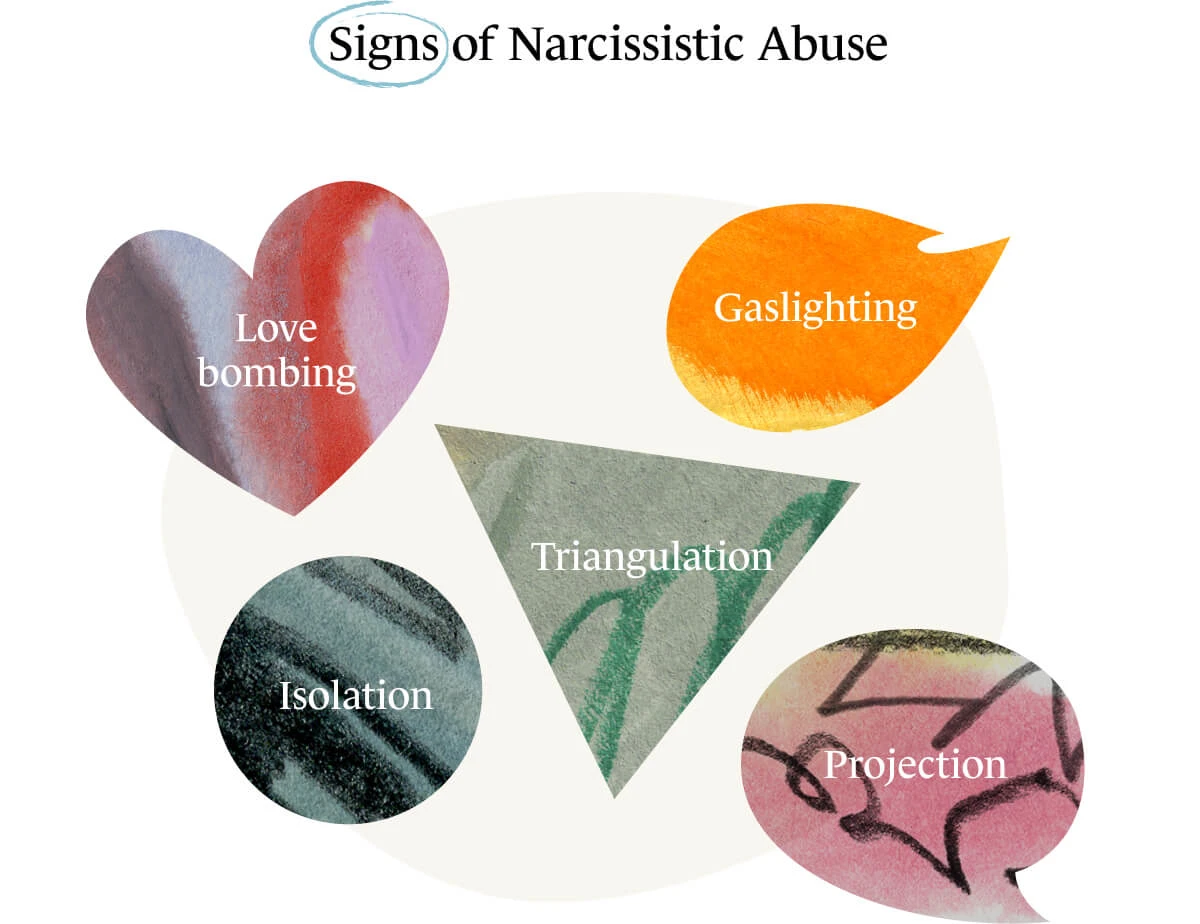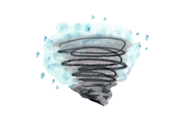If you’ve been in a romantic relationship with a narcissist—a person with narcissistic personality disorder (NPD)—you’ve almost certainly suffered some form of abuse.
Narcissistic abuse is psychological abuse; it's both mental and emotional.
And—as if that's not enough abuse—in addition, your narcissistic partner may also inflict financial abuse that causes money problems and debt.
Narcissistic abuse is psychological abuse; it's both mental and emotional.
Finally, in the most extreme cases, a love relationship with a narcissist can include physical or sexual abuse.
Read on to find out more about narcissists—from recognizing the personality style of a narcissist, to examples of how they treat their partners and lovers, and how to deal with the narcissist you're dating and heal from narcissistic abuse.
What's narcissistic personality disorder (NPD)?
Narcissistic personality disorder (aka NPD) is a condition that causes some people to feel more important than others.
Because they focus so much on themselves, it can be hard for narcissists to be loving, supportive partners.
A narcissistic partner can manipulate you into feeling confused, disoriented, exhausted, incompetent, inferior, isolated—the list goes on and on.
*A note here about language: I’ll be using the term “narcissist” as shorthand for a person who has the condition known as narcissistic personality disorder (NPD). This is not intended to be a judgment on those who have this condition. Narcissism is a disordered adaptation to one’s context, not a choice.
A narcissistic partner can manipulate you into feeling confused, disoriented, exhausted, incompetent, inferior, isolated—the list goes on and on.
While some narcissists are conscious of their abusive behavior, many are not.
Their disorder can lead them to believe their actions are normal.
In fact, most narcissists don’t believe they have a problem at all—so they’re not likely to seek treatment.
How can you tell if someone is narcissistic?
Most of us are never taught how to spot—and protect ourselves from—narcissists.
So, the first step toward recovery from narcissistic abuse may be recognizing that your significant other may have NPD.
While some narcissists are conscious of their abusive behavior, many are not.
It’s not uncommon for incredibly bright, healthy people to get sucked into relationships with narcissists.
Narcissists are often very charming.
They can use this charm to manipulate situations to their benefit.
But things may not remain appealing for long.

Relationships with narcissists are toxic
Narcissists cannot have healthy, authentic, loving relationships.
For starters, narcissists lack empathy. They simply don’t acknowledge other people’s feelings.
For someone with NPD, other people are merely the source of what’s called their “narcissistic supply.”
Narcissists lack empathy. They simply don’t acknowledge other people’s feelings.
Narcissistic supply is to a person with NPD what a fix is to a junkie—it’s a constant need or addiction they have for attention and energy.
This supply of attention and energy (i.e. yours!) essentially feeds your narcissist partner's physical, mental, and emotional needs.
What is narcissistic supply?
According to Sharie Stines, PsyD, LPCC who works with survivors of narcissistic abuse, narcissistic supply comes in many forms, including:
Attention (both positive and negative)
Compliments and praise
Feeling powerful (including having power over you)
Feeling in control (including controlling you)
Emotional energy, both positive and negative
Accomplishments like winning
Sex
Addictive substances or activities—which is one reason narcissists are extremely likely to have struggle with substance abuse
Being the source of this supply can leave a romantic partner feeling drained, demoralized, and exhausted.
Next are a few of the ways narcissists might use a partner to gain energy and otherwise fill their needs in a relationship.
Narcissists don’t listen—they lecture
One of the first things you might notice about a narcissist is the talking. Odds are you know everything about the narcissist in your life, but they know little about you.
That’s partly because narcissists don’t listen. They lecture or monologue.
Narcissists need attention
Narcissists need your full attention, and there’s no better way to ensure they get that attention than by filibustering.
According to Julie L. Hall, author of The Narcissist in Your Life, narcissists monologue because they:
Want control
Need attention
See themselves as expert authorities
Feel greater entitlement to speak
Don’t care what you have to say—unless it relates to them
Believe they are above codes of fairness and reciprocity
Feel powerful when they make you submit
When narcissists do listen, it’s often to learn information that they can use against you later—perhaps to manipulate you and guilt you into doing what they want.
Narcissists can’t handle pushback
In spite of their external bravado, people with NPD are incredibly fragile inside.
They can’t tolerate the slightest criticism.
And they have "secret feelings of insecurity, shame, vulnerability, and humiliation."
Narcissistic abuse can be subtle and it happens gradually, over a long period of time.
Narcissists can turn from Jekyll to Hyde with no warning.
Even when everything seems to be going well, if a narcissist interprets something you say as criticism, they can turn on you suddenly.
People with NPD insist on getting what they want, when they want it.
They often throw tantrums when they don’t get their way, or use their rage—or the threat of it—as another way to control and dominate others.

What do narcissists do to their partners?
It’s shockingly easy to spend years in a close relationship with a narcissist and not even realize you’re being abused.
Narcissistic abuse can be subtle and it can happen gradually, over a long period of time.
Narcissistic love bombing
In the beginning, someone with narcissistic personality disorder will turn on the charm and sweep you off your feet— they’ll shower you with love, attention, and praise.
Your relationship will be energizing, exciting, intoxicating. This is love bombing.
The narcissistic partner can be kind and generous.
It’s not uncommon for incredibly bright, healthy people to get sucked into relationships with narcissists.
Love bombing may not sound like abuse, but as Stines points out, it's merely the first phase of the relationship—the idealization phase—and it lays the groundwork for trouble to come.
According to Stines, after the idealization phase ends, it's followed by the devaluation phase (which is filled with narcissistic abuse).
Later, the devaluation phase is followed by the discard phase—which is precisely as heartless as the name sounds—the time when the narcissist will leave you.

Narcissists will gaslight you
When you confront a narcissist about a lie, an abusive action, or any other transgression— they’ll typically do one of two things:
They’ll twist it around to make it your fault. ("You’re too sensitive," or "You take things too seriously.")
They’ll use a technique called gaslighting.
The term gaslighting comes from the 1944 movie Gaslight, in which a husband manipulates his wife into thinking she’s insane.
Narcissists can be experts at this form of psychological abuse.
Essentially, with gaslighting, narcissists abuse you twice:
Abuse 1: They lie to you.
Abuse 2: Then they convince you that you misunderstood what they’d said—or that the first abuse never happened.
Narcissists will isolate you
Gaslighting is particularly awful when it’s combined with another narcissist specialty: isolation techniques that cut you off from friends and family.
Without your support system, you become completely dependent on the narcissist.
Combined with gaslighting—which can lead a person to not even trust themselves—this can be catastrophic.
Narcissistic triangulation and projection
Triangulation is another common narcissistic manipulation technique.
In these situations, the narcissistic partner will try to create an artificial love triangle by involving a third person in your relationship.
Doing this creates an abundance of narcissistic supply in the form of energy and attention from two different people.
It feeds a narcissist’s endless need for admiration.
Narcissistic triangulation is often accompanied by projection.
Through projection the narcissist may project all of their own positive qualities onto an exciting new playmate—idealizing this new person as “perfect.”
Simultaneously, the narcissist may project all of their negative traits onto you—denigrating you as “utterly flawed.”
How dating a narcissist changes you
After a relationship with a narcissist, you may experience emotional exhaustion and insecurity.
Additionally, dating—and breaking up with—a narcissist can leave you:
Feeling powerless
Feeling worthless
Filled with shame, guilt and humiliation
Anxious and always on high alert
Dealing with depression and mood-related issues
Grappling with cognitive dissonance
Afraid to get into another relationship
Financially drained
With nonexistent boundaries
Steps to heal from narcissistic abuse
Recovering from a relationship with a narcissist is unlike getting over any other relationship.
Narcissistic abuse cuts deep.
That said—it’s definitely possible to heal.
Here are several steps Stines recommends you take on your path to recovery:
Adopt a mantra. Remind yourself that it’s not your fault. (Stines recommends making “It’s not my fault” your daily mantra.)
Grieve. You experienced real losses. You suffered trauma and heartbreak. The relationship—and the future—you envisioned didn’t happen. Grief is normal and necessary.
Get to know yourself again. What do you enjoy?
Find your voice. Learn to express your boundaries.
Take good care of yourself. Prioritize self-care.
Don’t take things personally. Remember that other people’s actions are about them and often come from their own woundedness.

Tips to deal with a narcissist
You may not want to hear this, however it’s essential to cease contact with the narcissist.
If that’s not possible—perhaps because you’re co-parenting or still going through a divorce—they recommend using a technique called grey rock.
The idea is to become as bland as a grey rock.
No matter what the narcissist says or does—you don’t react.
By becoming a grey rock, you stop being a source of narcissistic supply.
You become boring and useless to the person with NPD.
However, there are times when this technique can be dangerous—particularly with a violent narcissist—so it’s important to stay aware of your situation and remain cautious.
Find a therapist who specializes in narcissistic abuse
In many cases, it’s wise to find a therapist who understands narcissistic abuse and the unique dynamics of a relationship with a narcissist.
Recovery will likely take some effort.
However, it's never worth remaining in a relationship with a narcissist—especially when you lose and give away so much of your energy and personality in order to stay with your narcissistic partner.
Am I a narcissist or is my partner?
Perhaps some of these situations sound a little bit too familiar... Take our 3-minute online narcissism personality traits test to find out if you, or someone you know, has symptoms of narcissistic personality disorder. Results are completely confidential.
READ NEXT: 5 Phrases Gaslighters Use to Manipulate Us
If you think you've been a victim of narcissistic abuse, consider seeing a mental health professional. The Monarch Directory by SimplePractice can help you find a therapist who specializes in overcoming abuse in relationships.
About Christine. (2020). Retrieved: https://narcissisticbehavior.net/about-me/
Ballard Z. (2015, August 24). How narcissists triangulate: Death of a heart by a 1000 cuts. Retrieved from: http://www.thenarcissisticpersonality.com/triangulation/
Caligor, E., Levy, K. N., & Yeomans, F. E. (2015). Narcissistic personality disorder: Diagnostic and clinical challenges. American Journal of Psychiatry, 172(5), 415–422. https://doi.org/10.1176/appi.ajp.2014.14060723
Cikanavicius, D. (2019, October 20). Triangulation: The narcissist’s best play. PsychCentral. Retrieved from: https://blogs.psychcentral.com/psychology-self/2019/10/triangulation-and-narcissism/
Hall, J. L. (2020). The narcissist in your life: Recognizing the patterns and learning to break free. Boston, MA: Da Capo Lifelong.
Mitra, P., Fluyau, D. (2020). Narcissistic Personality Disorder. Stat Pearls. Retrieved from: https://www.ncbi.nlm.nih.gov/books/NBK556001/
Paroma Mitra, & Dimy Fluyau. (2020, April 15). Narcissistic personality disorder. Retrieved from: https://www.ncbi.nlm.nih.gov/books/NBK556001/
Stines, S. (2020, June 22). Are you being emotionally abused? PsychCentral. Retrieved from: https://pro.psychcentral.com/recovery-expert/2020/06/are-you-being-emotionally-abused/
Taylor, J. (2013). Behind the veil: Inside the mind of men who abuse. Psychology Today. Retrieved from: https://www.psychologytoday.com/us/blog/the-reality-corner/201302/behind-the-veil-inside-the-mind-men-who-abuse
Wilson, S., Stroud, C. B., & Durbin, C. E. (2017). Interpersonal dysfunction in personality disorders: A meta-analytic review. Psychological Bulletin, 143(7), 677–734. https://doi.org/10.1037/bul0000101







